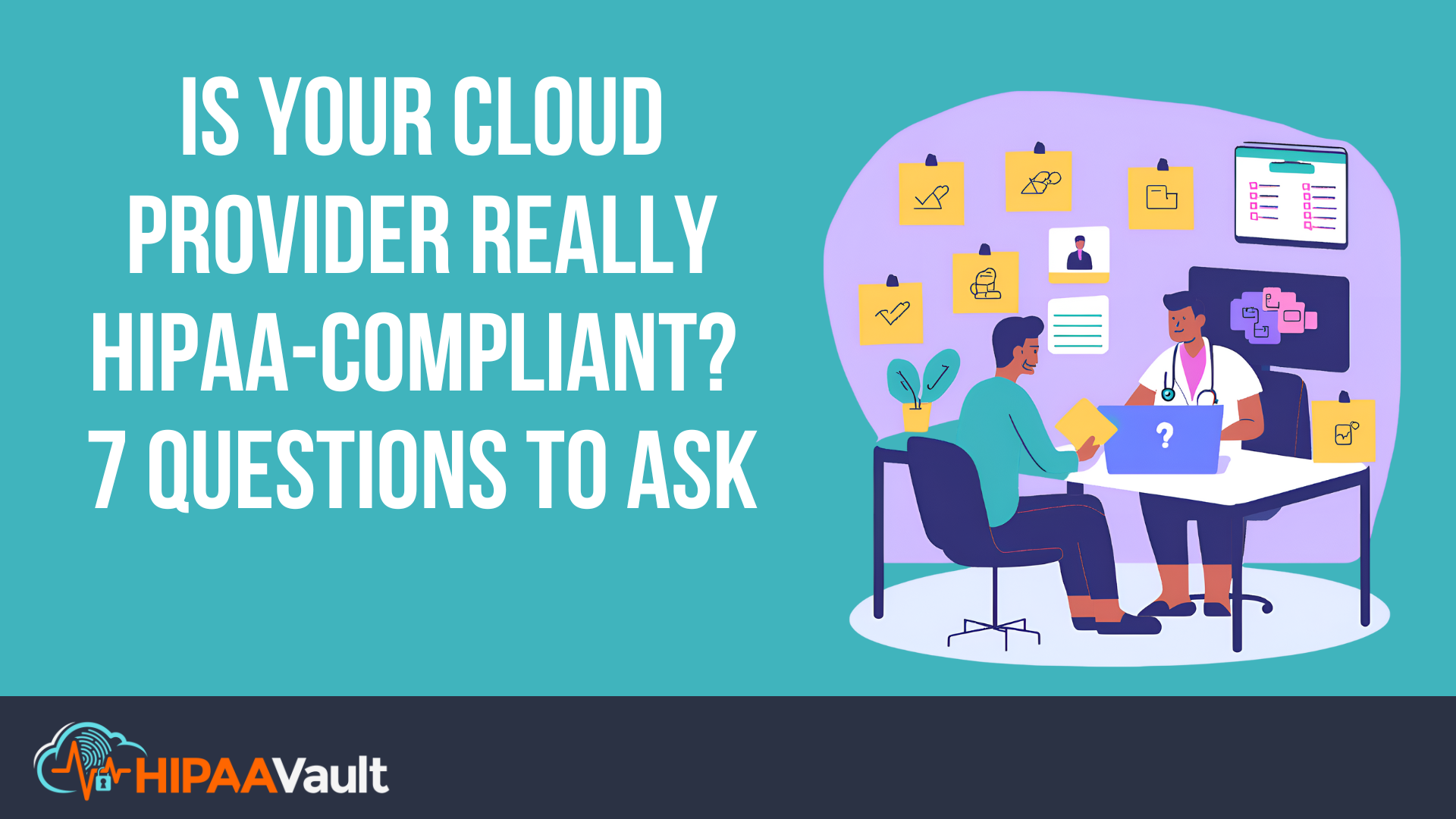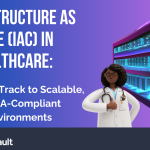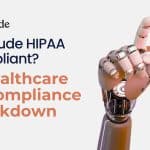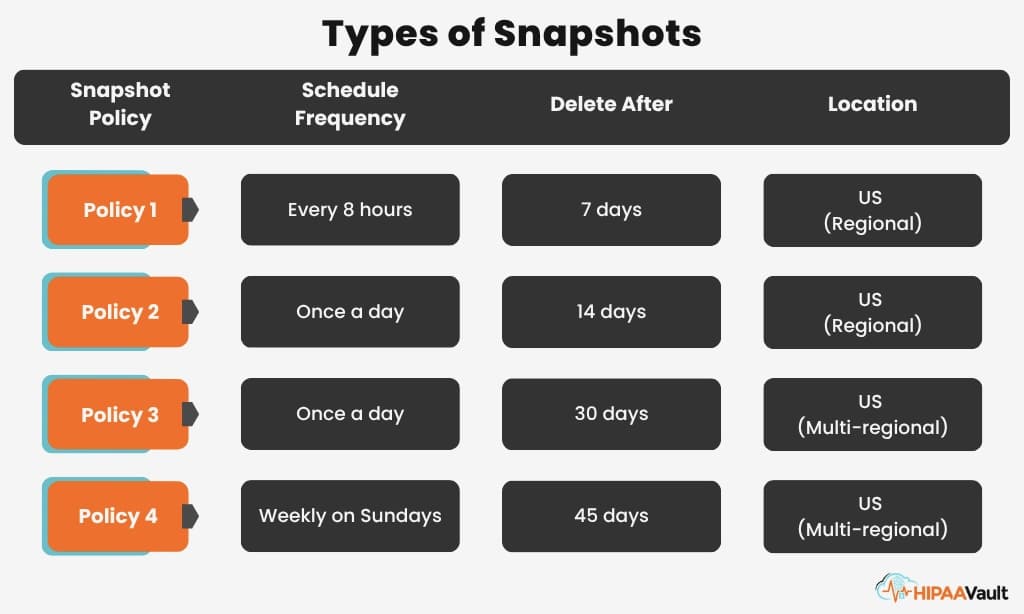Is Your Cloud Provider Really HIPAA-Compliant? 7 Questions to Ask
Introduction: The Cost of Misplaced Trust
Behind every “HIPAA-compliant” label lies a promise—but not all are built to protect your patients or your organization when it matters most. In today’s complex healthcare landscape, where the average data breach can cost millions in damages and loss of trust, the selection of a cloud provider is a critical compliance decision.
At HIPAA Vault, we’ve spent over two decades securing sensitive data for healthcare providers, payers, and public health systems, including large projects like the Wyoming Eligibility System. We’ve seen firsthand how often healthcare organizations assume compliance only to uncover significant security and regulatory gaps—often too late.
This article is designed to help healthcare IT teams, compliance officers, and executive decision-makers avoid these risks by asking the right questions before signing on with any cloud provider.
What “HIPAA-Compliant” Actually Means (and What It Doesn’t)
HIPAA compliance is not a one-time declaration or a simple checkbox. It is a comprehensive framework of administrative, physical, and technical safeguards, supported by documented processes and enforced policies.
Unfortunately, many cloud providers rely on vague language in their marketing, claiming HIPAA compatibility without offering the necessary accountability. A Business Associate Agreement (BAA), while mandatory, is only the starting point. True compliance involves:
- Proven technical safeguards such as encryption and access control
- Continuous monitoring and security audits
- Staff training and documented policies
- Support for breach notification and remediation
Organizations should also look for providers that demonstrate readiness through verifiable certifications and align with national compliance standards.
Seven Critical Questions to Ask Any Potential Cloud Provider
1. Do You Sign a BAA, and What’s Covered in It?
The absence of a signed BAA should be a non-starter. Beyond this, healthcare organizations must ensure that the BAA clearly articulates the responsibilities of each party, including provisions for incident response, data handling, and breach notification. A vague or overly generic BAA may signal that the provider is not fully prepared to manage the obligations of HIPAA compliance.
2. How is Protected Health Information (PHI) Encrypted at Rest and in Transit?
Encryption is a fundamental safeguard required by HIPAA. However, it’s important to validate the actual mechanisms used. Ask whether the provider uses advanced encryption standards such as AES-256, and whether keys are managed securely. Ensure that encryption applies to both data at rest (such as on storage volumes) and in transit (such as during transmission over public or private networks).
3. Who Has Access to My Data, and How is That Access Monitored?
Providers must be able to demonstrate fine-grained access controls, including role-based access permissions, multi-factor authentication, and detailed audit trails. Visibility into who accesses your data—and under what circumstances—is essential not only for compliance but for maintaining trust. Providers should also be able to share regular reports on access and log activity.
4. What Certifications Do You Hold That Demonstrate Compliance?
Certifications offer third-party validation of a provider’s security posture and operational maturity. Look for providers that meet federal and industry-recognized standards, such as:
- SBA 8(a) certification
- CAGE code and DUNS number registration for government readiness
- State-level designations such as California DBE and SBE
- NAICS classification for data processing and cloud services
In addition, providers should operate within secure, compliant infrastructures like FedRAMP-authorized cloud platforms and maintain readiness for audits such as HITRUST, SOC 2, or FISMA. These credentials indicate not only regulatory alignment but also operational reliability in complex, high-stakes environments.
5. How Quickly Do You Respond to Security Incidents?
Healthcare organizations cannot afford long downtimes or delayed responses. Clarify whether the provider offers 24/7/365 monitoring and how quickly their team typically responds to incidents. Service Level Agreements (SLAs) should specify maximum response times for critical events, including suspected breaches or service outages.
At HIPAA Vault, for example, our clients benefit from a dedicated, U.S.-based team offering under 15-minute response times—ensuring that issues are addressed swiftly and comprehensively.
6. Do You Provide Continuous Compliance Monitoring?
Compliance is not a one-time milestone—it is an ongoing obligation. Your provider should offer proactive tools to maintain and document compliance. This includes vulnerability scanning, automated patch management, intrusion detection, and security information and event management (SIEM) systems. Real-time monitoring not only mitigates risk but also supports compliance documentation for audits and reviews.
7. Can You Support External Audits and Breach Notification Requirements?
HIPAA requires that covered entities and their business associates have the ability to demonstrate compliance and respond effectively to breaches. Your provider should assist in generating audit logs, documenting system configurations, and preparing reports as needed. They should also be prepared to support you in meeting federal and state-specific breach notification timelines if an incident occurs.
Red Flags That Signal Incomplete Compliance
Even if a provider uses the term “HIPAA-compliant,” several warning signs may indicate otherwise. These include:
- Lack of a formal, documented risk assessment
- Inability or unwillingness to share detailed access logs
- No mention of certifications, accreditations, or procurement readiness
- A self-service or unmanaged hosting model with no built-in safeguards
- Generalized marketing language with no reference to real-world deployments or audit support
In short, a provider that cannot articulate a well-documented compliance strategy is unlikely to offer reliable protection for your PHI.
How HIPAA Vault Answers These Questions with Confidence
At HIPAA Vault, compliance is at the core of everything we do. We’ve engineered our entire service model around the specific needs of healthcare and government organizations. Here’s how we address these questions:
- Every client engagement includes a fully executed Business Associate Agreement and detailed onboarding process to assess risks and apply the appropriate safeguards.
- Data is encrypted at rest and in transit, using industry-leading cryptographic standards and managed through secure key management protocols.
- Access is restricted using identity-based access controls and is monitored continuously with detailed logging and alerts.
- We leverage a FedRAMP-approved Google Cloud infrastructure and align with standards like HITRUST, FISMA, and SOC.
- HIPAA Vault is recognized as an SBA 8(a) certified, HUBZone-awarded, and minority-owned small business, with NAICS, DBE, and SBE designations that underscore our procurement and operational credibility.
- Our infrastructure-as-code (IaC) deployments provide consistency, scalability, and rapid recovery while minimizing human error.
- Real-time compliance monitoring, advanced security detection, and 24/7/365 support are standard for every client.
Healthcare organizations ranging from startups to government systems like the Wyoming Eligibility System have trusted HIPAA Vault to design, implement, and maintain secure, compliant cloud environments tailored to their unique needs.
Conclusion: Trust Is Earned Through Transparency and Performance
Selecting a HIPAA-compliant cloud provider is not just about avoiding penalties—it’s about building a foundation of security, reliability, and long-term success. The right provider should operate not as a vendor, but as a partner in your compliance journey.
HIPAA Vault brings together technical expertise, real-world implementation experience, and verified credentials to deliver a cloud environment you can trust. With proven solutions for both commercial and federal clients, we help healthcare organizations reduce risk, maintain regulatory alignment, and focus on delivering high-quality care.
To learn more about our cloud hosting solutions or to assess your current provider’s compliance posture, visit HIPAA Vault’s HIPAA Compliant Cloud Hosting page or contact us for a personalized consultation.








